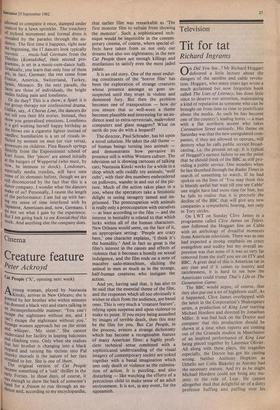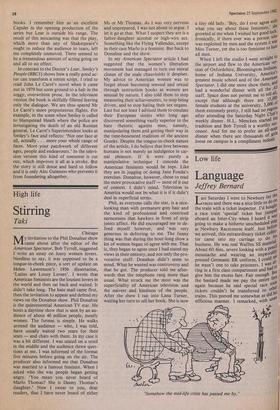Television
Tit for tat
Richard Ingrams
on Did You See..? Mr Richard Hoggart ‘.../ delivered a little lecture about the dangers of the satellite and cable revolu- tion. Hoggart, who many years ago wrote a much acclaimed but now forgotten book called The Uses of Literacy, has done little since to deserve our attention, maintaining a kind of reputation as someone who can be brought on from time to time to pontificate about the media. As such he has become one of the country's leading bores — a man with a flat northern accent who takes Coronation Street seriously. His theme on Saturday was that the new unregulated com- panies, if they are allowed to operate, will destroy what he calls public service broad- casting, i.e. the present set-up. It is typical of Hoggart's earnest failure to see the point that he should think of the BBC as still pro- viding a public service. One wonders when he last thumbed through the Radio Times in search of something to watch. If he had spoken on the lines of `You may think this is bloody awful but wait till you see Cable' one might have had more time for him, but he fails to realise that it is precisely the decline of the BBC that will give any new companies a sympathetic hearing, not only in Tory circles:
On LWT on Sunday Clive James in a programme called Clive James on Televi- sion followed the Hoggart line on Cable with an anthology of dreadful moments from American television. There was as one had expected a strong emphasis on crazy evangelism and nudity but my overall im- pression was that none of it was so very far removed from the stuff you see on ITV and BBC. A great deal of this is American tat in any case and if it comes to inanity and tastelessness, it is hard to see how the Americans could trump That's Life or The Generation Game.
The BBC would argue, of course, that they also put out a lot of highbrow stuff. As it happened, Clive James overlapped with the latest in the Corporation's Shakespeare series, a production of King Lear starring Michael Hordern and directed by Jonathan Miller. It was bad luck on the Doctor and company that this production should be shown at a time when reports are coming out of the Granada studios in Manchester of an inspired performance of King Lear being pieced together by Laurence Olivier. All along with these plays, the tragedies especially, the Doctor has got his casting wrong. Neither Anthony Hopkins as Othello nor Colin Blakeley as Antony had the necessary stature. And try as he might Michael Hordern could not bring any ma- jesty to the role of Lear. He cannot altogether shed that delightful air of a dotty professor huffing and puffing over his books. I remember him as an excellent Capulet in the opening production of the series but Lear is outside his range. The result of this miscasting was that the play, which more than any of Shakespeare's ought to reduce the audience to tears, left me completely unmoved. There seemed to be a tremendous amount of acting going on and all to no effect.
In contrast to the Doctor's Lear, Smiley's People (BBC1) shows how a really good ac- tor can transform a rotten script. I tried to read John Le Carre's novel when it came out in 1979 but soon ground to a halt in the soggy, overwritten prose. In the television version the book is skilfully filleted leaving only the dialogue. We are thus spared Mr Le Carre's more preposterous flights. For example, in the scene when Smiley is called to Hampstead Heath where the police are investigating the death of an old Russian general, Le Carre's Superintendent looks at Smiley's face and reflects: 'Not one face at all, actually . . . more your whole range of faces. More your patchwork of different ages, people and endeavours.' In the televi- sion version this kind of nonsense is cut out, which improves it all at a stroke. But the story is still dense and hard to follow and it is only Alec Guinness who prevents it from foundering altogether.



































 Previous page
Previous page